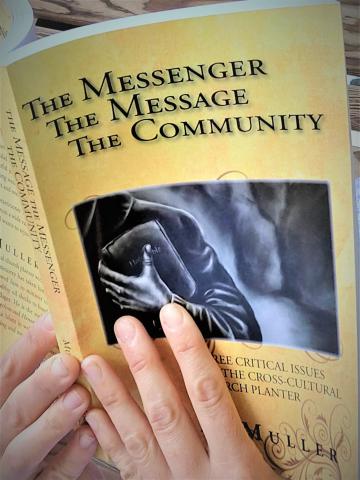Book Review of The Messenger, the Message, the Community, by Roland Muller
Part 3 of 3, THE COMMUNITY
After learning about the making of a messenger and the three-fold Eden effect, Muller felt ready to continue ministry as a church planter. But through frustration and failure, he was to discover yet another serious area of ignorance.
A friend helped Muller discover the reality of the church as community by challenging him to put himself in the place of a seeker. Especially in some cultures, the seeker “will probably assume he is exploring the message as he works through understanding the community. The message and the community are usually one and the same to him.”
If this sounds strange to us, we should consider Muller’s charge that Western Christians are like the rich young ruler who came to Jesus and went away sorrowful. We lack one thing: an others-focus that finds expression in community.
Jesus asked that young man to sell what he had, give it to the poor, and come follow Him. “Somehow,” says Muller, “we have fooled ourselves into thinking that this was simply Jesus’ test to show the rich young ruler that he was wrong. We ignore the fact that we too would fail the test if it was given to us. Jesus is looking for servitude expressed through helping others.”
Muller identifies this others-focus as the heart of community. Jesus Himself identified the message (“By this shall all men know”) with the community (“if you have love one for another”). The individualistic mindset of the West breeds a carnal self-centeredness that stifles community. In this kind of church life, each person looks out for his own things more than the things of others. Seekers, convinced of the authenticity of the messenger and his message, may turn away when the community fails to prove authentic.
__________
Such tragedies are far too common, but how do they happen? Muller highlights at least two factors.
First, misunderstanding often contributes to such tragedies. Where worldviews are radically different, the way a seeker approaches the church may be quite different from the messenger’s expectations. For example, a messenger with a Western mindset expects a sequence something like this: Evangelism, followed by Discipleship, followed by joining a Christian Community (local church). Unfortunately, we know that many seekers never get past the first or second phase, or in attempting the third, are unsuccessful.
The seeker in a community-type, honor-based culture will tend to come to the church differently. He will begin by exploring the community and whether he will be allowed to truly belong. Having confirmed this, he will continue with a process of exploring which includes what we think of as discipleship. And in some cases the process is so completely reverse that the seeker does not fully accept the message (what we think of as the evangelism phase) until after all of the above. This approach can greatly confuse the messenger with a community-last mindset and raise the potential for friction and hurt.
Second, such tragedies may occur because the community we offer is only theoretically available for the seeker to belong. When it comes to the test, the seeker finds that, functionally, the community is closed to him. He can never truly belong. In mission settings, this tendency is strongest where missionaries build their social life around each other and draw heavily on supporters back home. Seekers, attracted to the show of community, come close only to find that true belonging is out of their reach.
These things occur not only on foreign mission fields. Much of what Muller writes in this section applies to churches and seekers in the West as well. Muller suggests, “Before we attempt to provide seekers with too many answers, we should stop and examine some of the steps they may pass through as they enter into a Christian community, whatever that community looks like.”
__________
So, what about all this talk of community? Is it a truly New Testament understanding of church life?
In light of the New Testament emphasis on “one another,” this question shouldn’t be too difficult to answer. Let it be clear, however, that New Testament community is a way of life, not necessarily a commune. Muller is careful to make that distinction.
What is Christian community then? Muller explores four New Testament terms that describe Christian community. He summarizes with this list:
- Kingdom (the Lordship of Christ and our role as stewards)
- Bride (we are loved; we enter into an eternal love relationship)
- Assembly (ekklesia; we should gather together in some form of exercise being the body of Christ)
- Body (each member has a part to do; when we function together, Christ functions in our midst)
Studying each of these New Testament terms helps demonstrate that the community concept is not only valid, but essential. The church is to be a clearly-defined community where anyone, from any background, can come and be a member of the body of Christ with us.
For the cross-cultural church planter, or for the North American church member, this is a goal to strive for.

